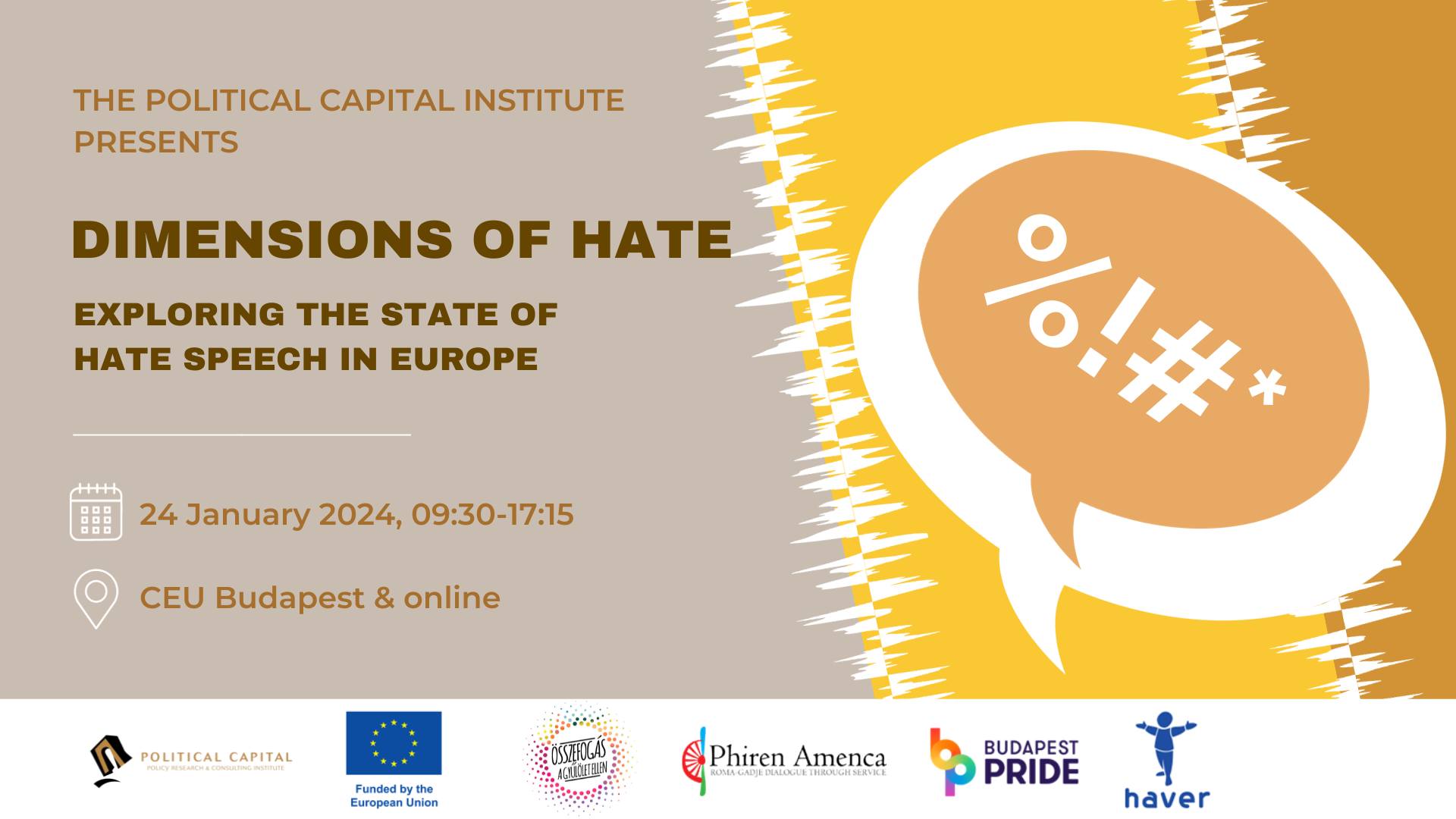Dimensions of Hate – Exploring the State of Hate Speech in Europe
Hate speech is not only a national problem but a pan-European and even a global issue, which has clearly been demonstrated by the increasing antisemitic content spread since 7 October 2023. Therefore, it is of high priority to examine the topic in a European context from multiple angles, such as socio-political contexts, manifestation forms, regulation, the role of the media and AI, and effective counterstrategies.
The conference aims to explore the issues of hate speech against minority groups from a European perspective and provide a space for European exchange of experiences and information and networking among members of the affected groups, experts, CSOs and representatives of international organisations.
Date: 24 January 2024
Venue: Central European University (1051 Budapest, Nádor street 15.) N15 106.
Language: English (without interpretation)
Please register for the event here: https://forms.gle/sT3iG6BvpEmLDC6e7

Program
9.30-9.40 Welcoming remarks and introduction to the CHAD project
Bulcsú Hunyadi – Head of Programmes, Political Capital
Erzsébet Szalayné Sándor – Deputy Commissioner for Fundamental Rights, Ombudsman for the Rights of National Minorities in Hungary
Anna Daróczi – Project Coordinator, Phiren Amenca
9.40-10.00 Hate speech in the European societies - introductory keynote speech
Tamás Berecz – General Manager, International Network Against Cyber Hate
10.00-11.15 Hate speech in the European societies - panel discussion
Dániel Bagaméri – Head of Office (Budapest), International Organisation for Migration
Rémy Bonny – Executive Director, Forbidden Colours
Vivien Brassói – Legal Director, European Roma Rights Center
Jessica Lewin – Senior Research Analyst, World Jewish Congress
Moderator: Anikó Félix – CEO, Haver Foundation
11.15-12.30 Hate speech and the media – panel discussion
Beata Balogová – Editor-in-Chief, SME Daily
Tamás Berecz – General Manager, International Network Against Cyber Hate
Gábor Polyák – Head of Research, Mérték Media Monitor
Joanna Szymańska – Senior Programme Officer (Europe and Central Asia), Article19
Moderator: Eszter Neuberger – journalist, Lakmusz
12.30-13.40 Lunch break
13.40-14.00 Dilemmas and challenges of hate speech regulation across Europe – keynote speech
Louisa Klingvall – Head of Unit, European Commission - Directorate General Justice and Consumers Unit C.2 Fundamental Rights Policy [online]
14.00-15.15 Dilemmas and challenges of hate speech regulation across Europe – panel discussion
Tamás Dombos – Project Coordinator, Háttér Society
Louisa Klingvall – Head of Unit, European Commission - Directorate General Justice and Consumers Unit C.2 Fundamental Rights Policy [online]
András László Pap – Research Professor, HUN-REN Centre for Social Sciences Institute for Legal Studies; Professor, Eötvös University Faculty of Economics
Erzsébet Szalayné Sándor – Deputy Commissioner for Fundamental Rights, Ombudsman for the Rights of National Minorities in Hungary
Moderator: Katalin Szajbély - lawyer, Hungarian Helsinki Committee
15.15-15.45 Coffee break
15.45-17.00 Hate speech and artificial intelligence – panel discussion
Laurine Chabal – Advocacy Officer, #jesuislà [online]
Gergely Lendvai – Research Fellow, Information Society Law Center, University of Milan; PhD candidate, Pázmány Péter Catholic University
Sara Sighinolfi – Programme Officer, EU Fundamental Rights Agency [online]
Zsolt Ződi – Senior Research Fellow, National University of Public Service
Moderator: Kis Kelemen Bence – Senior Lecturer, University of Pécs Faculty of Law
17.00-17.15 Closing remarks
The „CHAD – Countering Hate Speech and Hurtful Speech against Diversity: Roma, LGBTIQ, Jewish and Migrant Communities” project (project nr. 101049309) is funded by the Citizens, Equality, Rights and Values Programme (CERV) of the DG Justice, European Commission.

